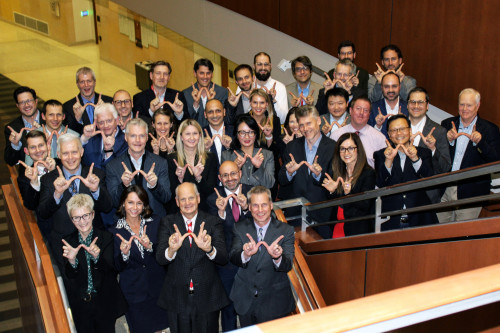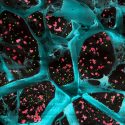UW–Madison and GE HealthCare broaden shared commitment to health care innovation

Leaders from the UW School of Medicine and Public Health and GE HealthCare gather to celebrate the commitment. From left to right: Frank Korosec, professor in the UW Department of Radiology; Scott Reeder, senior vice chair of research for the UW Department of Radiology; Thomas Grist, chair of the UW Department of Radiology; Erin Angel, VP, U.S. and Canada Research and Scientific Affairs at GE HealthCare; Catherine Estrampes, President and CEO, U.S. and Canada at GE HealthCare; and Jay Hill, VP, Advanced Technology at GE HealthCare.
The University of Wisconsin–Madison School of Medicine and Public Health and GE HealthCare announced today a 10-year strategic collaboration that builds on an iconic relationship spanning more than 40 years. The new research collaboration expands the existing scope beyond medical imaging to new frontiers in digital technologies and disease-focused solutions.
Combining UW–Madison’s world-class team of physicians, scientists, and researchers with GE HealthCare’s expertise in modernizing medical technology, the new collaboration augments foundations in imaging and medical physics with future plans that could drive improved diagnosis and disease management through developments in magnetic resonance (MR), computed tomography (CT), ultrasound, interventional radiology (IR), theranostics and molecular imaging (MI) modalities, as well as patient care solutions. The collaboration is aimed at shaping the future of medical imaging, to improve the standard of care and patient outcomes. Furthermore, it has the potential to advance artificial intelligence (AI) and digital solutions across the care continuum to enhance clinical workflows and the delivery of more precise, personalized care with greater value.
“Our enduring relationship with GE HealthCare has led to advanced clinical technologies as a result of research that we have also seamlessly translated from benchtop to bedside and deployed in real-world clinical settings,” said Thomas Grist, MD, FACR, Chair, Department of Radiology at UW–Madison. “Technology will continue to play an important role in providing the best care possible for patients. With our shared goals of improving experiences for patients and cultivating more personalized care, the work of our combined teams has the potential to impact many patients around the world for years to come.”
Over the past decade, UW–Madison and GE HealthCare have conducted more than 130 research studies, leading to numerous scientific and technological advancements. For example, a landmark study using quantitative MRI to map iron concentration in the liver showed the potential for early liver disease detection and management. Additionally, in a study using GE HealthCare’s TrueFidelity deep learning reconstruction technology for CT imaging, the research teams optimized CT image quality and minimized radiation exposure to the patient.
“We have worked with University of Wisconsin–Madison for many years to help foster the future of biomedical technology, and this is a natural progression of our collaboration,” said Jay Hill, GE HealthCare Vice President of Advanced Technologies. “UW–Madison has a world-class research team ranked among the top ten in the nation and we are proud to help usher in the next frontier of more personalized care across key care areas. Our prospective work together in specialties such as nuclear medicine with emerging molecular imaging and theranostics applications could help improve future patient outcomes for life-threatening diseases such as prostate cancer.”
The UW–Madison Department of Radiology and Department of Medical Physics are playing instrumental roles in establishing an Institute of Theranostics and Particle Therapy within UW Carbone Cancer Center. With the goal of developing new curative cancer therapies, the effort demonstrates how research is quickly translating into patient care.

Colleagues from UW–Madison and GE HealthCare give the W sign in celebration of the next ten years of strategic collaboration.
The decades-long history between GE HealthCare and UW–Madison has an established track record of combining innovative resources to transform patient care. Most recently, UW–Madison became the first U.S. research scanning site for GE HealthCare’s novel silicon-based photon counting CT prototype [i], engineered with Deep Silicon detectors with the aim to enhance imaging capabilities to help clinicians improve patient outcomes. GE HealthCare and UW–Madison have also partnered to create standardized CT protocols for GE HealthCare systems that have been distributed to more than 4,000 sites globally. Other areas of past focus include UW–Madison’s contributions in creating new MR imaging (MRI) technology, such as GE HealthCare’s SIGNA™ Premier 3T MRI scanner, as well as GE HealthCare’s AIR™ Recon DL, which utilizes deep learning algorithms to significantly improve the quality and speed of MRI scans. More broadly, GE HealthCare has collaborated with UW–Madison across patient care, monitoring solutions, digital and AI technology, and medical imaging with initiatives touching key care pathways in oncology, cardiovascular disease, and neurology.
GE HealthCare and UW–Madison have built a vital collaborative research and technology relationship, generating substantial health innovations including more than 100 patents. Wisconsin recently received the prestigious Regional Technology and Innovation Hub (Tech Hub) designation focused on biohealth, selected as one of 31 regions in the country with the highly-competitive Phase 1 Tech Hub designation.
To learn more about GE HealthCare’s solutions, visit https://www.gehealthcare.com/.



